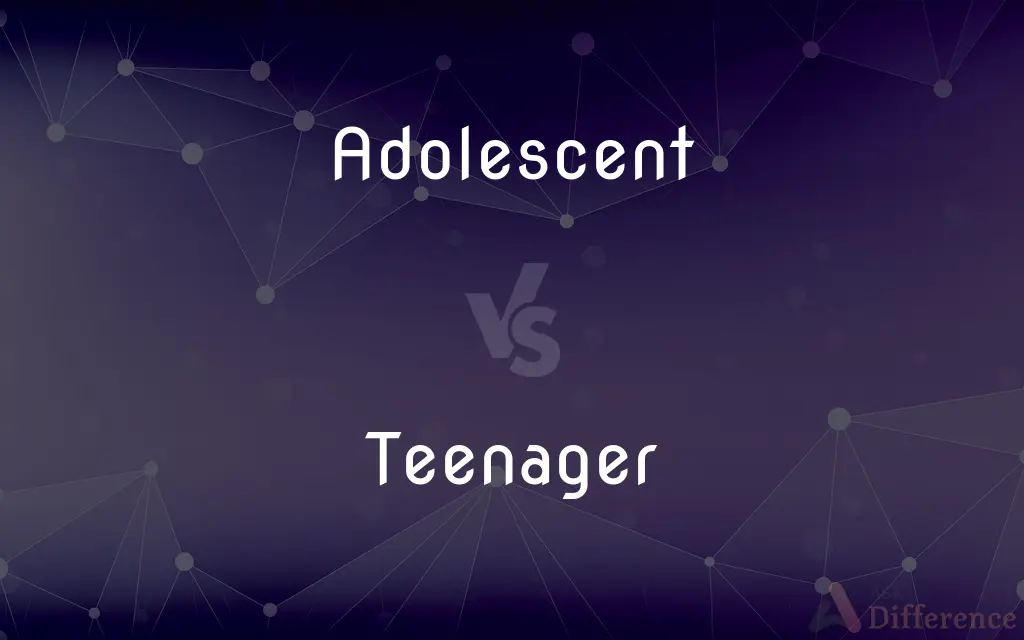Adolescent vs. Teenager — What's the Difference?
By Urooj Arif & Maham Liaqat — Updated on March 11, 2024
Adolescent and Teenager both refer to young people transitioning from childhood to adulthood, but "adolescent" emphasizes the developmental stage, while "teenager" specifically denotes those aged 13-19.

Difference Between Adolescent and Teenager
Table of Contents
ADVERTISEMENT
Key Differences
Adolescence is a developmental stage that encompasses the transition from childhood to adulthood, typically starting around the age of 10 and ending in the early 20s. This period is marked by significant physical, emotional, cognitive, and social changes as individuals mature. Adolescents undergo puberty, which leads to physical growth and sexual development, and experience shifts in cognitive abilities and social dynamics. On the other hand, the term "teenager" refers more specifically to individuals within the age range of 13 to 19 years, highlighting the period where their age number includes the suffix "-teen." The concept of being a teenager often carries cultural and social connotations, focusing on the experiences, behaviors, and challenges common to this age group, such as identity exploration, increased independence, and peer influence.
While all teenagers are adolescents, not all adolescents are teenagers. The adolescent phase begins before the teenage years, typically around the onset of puberty, and can extend into the early twenties, encompassing the late teenage years and sometimes a bit beyond. This broader view recognizes that the transition from childhood to adulthood is not confined to the teenage years but is a gradual process involving substantial growth and change. In contrast, the teenage years are a more narrowly defined time frame that captures a specific, culturally recognized phase of youth.
The term "adolescent" is often used in contexts emphasizing psychological, biological, and developmental perspectives, such as in healthcare, psychology, and education. Professionals in these fields discuss "adolescent development" or "adolescent health" to address the wide range of changes and challenges individuals face during this period. Meanwhile, "teenager" is commonly used in everyday language and is often associated with social and cultural aspects of this age group, reflecting societal attitudes, trends, and issues relevant to individuals in their teen years.
Adolescents are navigating a critical period of identity formation, seeking autonomy while still requiring guidance and support from adults. This stage involves exploring personal values, beliefs, and goals, leading to a more defined sense of self. Teenagers, as a subset of adolescents, often grapple with these issues within the context of their social environments, including school, peer groups, and family, which can significantly influence their development and behaviors.
Teenagers are often portrayed as seeking independence, experimenting with different roles and identities, and establishing their place within peer groups. This portrayal highlights the social dynamics at play during the teen years, including peer pressure, the need for acceptance, and the exploration of relationships. Adolescents, in a broader sense, are also dealing with these issues, but the focus extends to encompass the full range of developmental changes occurring throughout this stage.
ADVERTISEMENT
Comparison Chart
Definition
Developmental stage from childhood to adulthood, typically from around 10 to early 20s
Specific age group within adolescence, 13-19 years
Focus
Biological, psychological, and social development
Cultural and social experiences specific to ages 13-19
Scope
Broader, includes early onset of puberty and can extend into early adulthood
Narrower, confined to years with "-teen" suffix
Usage in Professional Contexts
Common in psychology, healthcare, and education to discuss development
Less common, more used in everyday language and cultural contexts
Cultural Connotations
Emphasizes the transitional nature and developmental challenges
Often associated with social dynamics, identity exploration, and independence
Compare with Definitions
Adolescent
A young person in the transitional phase of physical and psychological development.
Adolescents experience rapid changes in height and weight.
Teenager
A person aged between 13 and 19 years.
Teenagers often face peer pressure in high school.
Adolescent
Seeking autonomy while relying on adult guidance.
Despite their desire for independence, adolescents benefit from parental support.
Teenager
Navigating educational and career choices.
Teenagers begin considering colleges and potential career paths.
Adolescent
Exploring personal identity and values.
Adolescents often experiment with different social roles and hobbies.
Teenager
Dealing with identity and self-esteem issues.
Teenagers frequently struggle with body image and self-confidence.
Adolescent
Navigating increased cognitive abilities and more complex social interactions.
Adolescents start to think more abstractly and critically about their surroundings.
Teenager
Experiencing the social and cultural aspects of adolescence.
Teenagers are heavily influenced by trends and social media.
Adolescent
Characterized by the onset of puberty and the beginning of sexual maturation.
Many adolescents become more self-conscious during puberty.
Teenager
Gaining independence and exploring relationships.
Many teenagers start dating and forming deeper friendships.
Adolescent
Of, relating to, or undergoing adolescence.
Teenager
A person between the ages of 13 and 19; an adolescent.
Adolescent
Characteristic of adolescence; immature
An adolescent sense of humor.
Teenager
A person between 13 and 19 years old.
Most teenagers will undergo lots of changes before reaching adulthood.
Adolescent
A young person who has undergone puberty but who has not reached full maturity.
Teenager
A person whose age is in the teens, i.e. one between the ages of 13 to 19 inclusive.
Adolescent
Of, relating to, or at the age of adolescence; at the stage between being a child and an adult.
Teenager
A juvenile between the onset of puberty and maturity
Adolescent
A person who is in adolescence; someone who has reached puberty but is not yet an adult.
Adolescent
Growing; advancing from childhood to maturity.
Schools, unless discipline were doubly strong,Detain their adolescent charge too long.
Adolescent
A youth.
Adolescent
A juvenile between the onset of puberty and maturity
Adolescent
Relating to or peculiar to or suggestive of an adolescent;
Adolescent problems
Adolescent
Being of the age 13 through 19;
Teenage mothers
The teen years
Adolescent
Displaying or suggesting a lack of maturity;
Adolescent insecurity
Jejune responses to our problems
Their behavior was juvenile
Puerile jokes
Adolescent
In the state of development between puberty and maturity;
Adolescent boys and girls
Common Curiosities
Does adolescence always end at 19?
No, adolescence can extend into the early 20s, beyond the teenage years.
Are all teenagers considered adolescents?
Yes, all teenagers are within the adolescent developmental stage.
Are teenagers more susceptible to peer pressure?
Yes, the desire for acceptance and belonging can make teenagers more vulnerable to peer pressure.
Why is adolescence important?
Adolescence is crucial for physical, cognitive, and social development, laying the foundation for adulthood.
Can adolescence start before the teenage years?
Yes, adolescence typically begins around the onset of puberty, which can be before the teenage years.
How do societal expectations affect teenagers?
Societal expectations can significantly influence teenagers' behavior, self-esteem, and identity formation.
Is the concept of a teenager universal?
While adolescence is a universal developmental stage, the social construct of a "teenager" can vary culturally.
How do adolescents form their identity?
Identity formation involves exploring different roles, values, and beliefs, often influenced by family, peers, and societal norms.
Is there a difference in how boys and girls experience adolescence?
Yes, there can be differences due to biological factors, social expectations, and individual experiences.
How do adolescents cope with change?
Adolescents cope through a mix of support from adults, peer relationships, and personal exploration.
Can the challenges of adolescence impact mental health?
Yes, the challenges and changes during adolescence can affect mental health, making support crucial.
How has the digital age affected teenagers?
The digital age has significantly impacted teenagers, influencing their social interactions, access to information, and identity exploration.
What role do parents play in an adolescent's life?
Parents provide guidance, support, and boundaries, helping adolescents navigate the challenges of this developmental stage.
How do education systems support adolescent development?
Education systems can support adolescents by addressing their developmental needs, offering guidance, and promoting a supportive learning environment.
Can cultural background influence the adolescent experience?
Yes, cultural background can shape the experiences, expectations, and challenges faced by adolescents.
Share Your Discovery

Previous Comparison
Ferromagnetism vs. Antiferromagnetism
Next Comparison
Mutualism vs. CommensalismAuthor Spotlight
Written by
Urooj ArifUrooj is a skilled content writer at Ask Difference, known for her exceptional ability to simplify complex topics into engaging and informative content. With a passion for research and a flair for clear, concise writing, she consistently delivers articles that resonate with our diverse audience.
Co-written by
Maham Liaqat















































